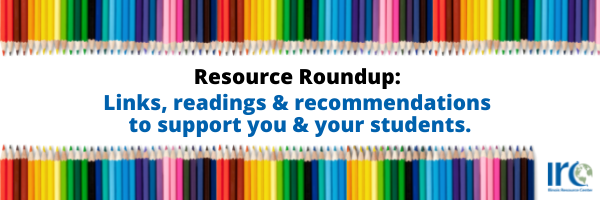This post is part of our ongoing “Language and Culture Lenses” series, where the IRC team discusses trends in education impacting our communities through language and cultural lenses, and how these conversations intersect with our vision of a world where every child’s languages and cultures are affirmed, every teacher’s practice is reflective and responsive, and every school’s systems and policies are inclusive and equitable. You can view the entire series here.
At the Illinois Resource Center, our vision is of an educational future where every child’s languages and cultures are affirmed, every teacher’s practice is reflective and responsive, every school’s systems and policies are inclusive and equitable. Over the past half-century, we have seen incredible progress across Illinois and the country in efforts to better understand and meet the needs of our multilingual, multicultural student populations, and ensure all Illinois students can learn, grow and thrive.
Students thrive best at school when their identities and experiences, including language, culture and the spaces where these all intersect, are included, affirmed and celebrated, and these attacks on education are significantly impacting the mental wellbeing of students and teachers, and encouraging more of the latter to leave the profession.
In recent years, there has been a nationwide surge of opposition to inclusive and equitable education practices under the banner of “Critical Race Theory,” itself a graduate-level concept unlikely to be taught in K-12 schools. No matter what it’s called, the rising rash of attacks on culturally-responsive teaching, anti-racist approaches, social-emotional learning, LGBTQ+ affirming practices, and inclusion of diverse reading material, jeopardizes the progress educators and advocates have made towards a strong, equitable education system in Illinois and beyond. The IRC also acknowledges that there are many educators doing the work of culturally responsive and inclusive teaching, but may be receiving backlash or risking their jobs in doing so. Our team sees and appreciates your efforts, and we are here for you.
The Illinois Resource Center strongly opposes attacks on teachers working to create more inclusive classrooms for marginalized and minoritized students. We urge districts and school boards to oppose challenges to inclusive, affirming reading material, curricula and instructional methods.
To support teachers in promoting and enacting inclusive, equitable education, we have compiled a list of resources to explore and share with colleagues and districts. Furthermore, if you would like additional support from the IRC for an upcoming meeting, curricular or instructional challenge, please use the contact form on our website and we will be able to provide a form letter to share with your board or colleagues.
We also want to make educators we work with aware of their own responsibilities, rights and resources around culturally responsive teaching. In 2021, the Illinois State Board of Education adopted the Culturally Responsive Teaching and Leading Standards, and the website shares background information and support to help your district apply them to your school communities.
Further Readings, Resources and Toolkits:
For an introduction to this issue, Education Week offers a downloadable PDF explaining what Critical Race Theory is and what it isn’t, and how it intersects with K-12 education.
Dr. Kimberlé Crenshaw, the scholar and advocate who coined the term “intersectionality,” reflects on the war on anti-racist teaching practices in the UCLA Law Review.
If you are ready to start taking small steps toward building an anti-racist teaching practice, this toolkit from the Student Advocacy Center offers introductory readings, resources and ways to get started.
For more information on why social emotional learning is essential to equitable education and student success, check out these resources from CASEL: Read What Does the Research Say? or view Equity and SEL – What Educators Need to Know and Do or find their framework and more resources in Equity and SEL Schoolguide.
Culturally Responsive Teaching and the Brain by Zaretta Hammond is a must-read text applying the latest neuroscience research to understanding the importance of culturally-responsive education; and the author offers further resources on her blog.
Students know when they are receiving an incomplete or whitewashed view of American history, as in this perspective from Learning for Justice. The Zinn Education Project’s TeachTruth Syllabus provides a grounded starting point for culturally responsive history instruction.
If you’re looking to take action at a school or community level to fight attacks on anti-racist and culturally responsive teaching, these toolkits may prove helpful. The Education Justice Research & Organizing Collaborative (EJROC) at NYU offers a school-oriented toolkit; as does AACTE. For a community/library-oriented approach, here’s a toolkit from Get Ready Stay Ready. Toolkits include sample letters, fact sheets, op-ed and more.


